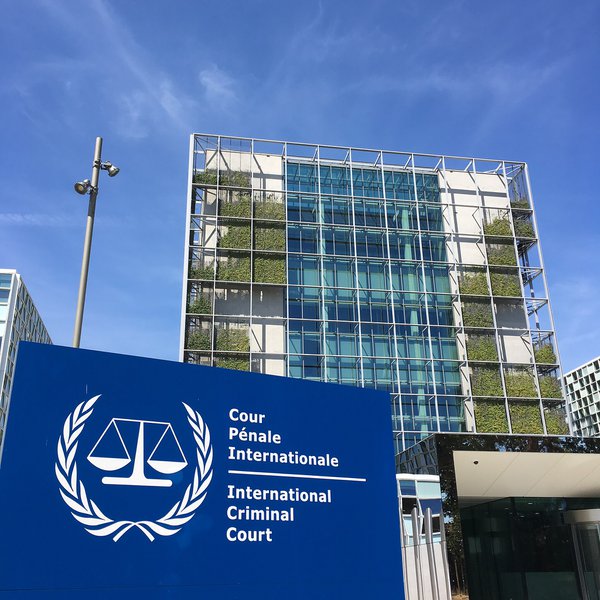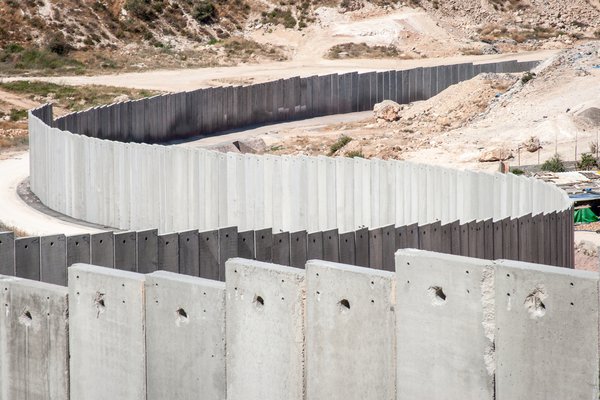As the ICJ reviews South Africa’s charges of Israel with genocide, it’s important to look at how the United States has responded to the court in the past.

Panorama of the International Court of Justice court room, principal judicial organ of the United Nations located at The Hague
BY STEPHEN ZUNES
JANUARY 20, 2024
Days before the start of 2024, South Africa initiated proceedings before the International Court of Justice (ICJ), charging that Israel was violating its obligations under the Convention on the Prevention and Punishment of the Crime of Genocide in its war on the civilian population of Gaza. The application requests a series of “provisional measures,” including a suspension of military operations in Gaza.
Genocide is one of those rare terms where the legal definition is broader than the popular understanding. It does not just include systematic mass extermination—such as the Holocaust, the Armenian Genocide, or the 1994 Rwandan genocide—but also military campaigns “committed with intent to destroy, in whole or in part, a national, ethnical, racial, or religious group.” Recent examples would include the Guatemalan junta’s campaign against Indigenous peoples in the highlands during the 1980s, Sudan’s war in Darfur, the attacks by Bosnian Serbs against Bosnian Muslims, Serbia’s war on Kosovo, Iraqi and Turkish campaigns against the Kurds, and the U.S. designation of “free fire zones” in rebel-held areas of Vietnam.
Israel’s indiscriminate military assault on crowded civilian areas in the Gaza Strip, the most destructive bombardment over a comparable time period in any war this century, would appear to meet such a definition.
Israel’s indiscriminate military assault on crowded civilian areas in the Gaza Strip, the most destructive bombardment over a comparable time period in any war this century, would appear to meet the definition of genocide.
Despite this, the Biden Administration and Congressional leaders have categorically denounced South Africa for submitting the application and the Court for considering it. Even in the face of overwhelming evidence presented by the South Africans, National Security Council spokesperson John Kirby has insisted that the submission is “meritless, counterproductive, and completely without any basis in fact whatsoever.” By contrast, there have been no objections raised over the concurrent application by Gambia that accuses Myanmar of genocide for its war on the Rohingya, or disagreements with previous genocide cases before the ICJ.
While the Biden Administration has stridently objected to South Africa’s case, it has also acknowledged that it has not conducted any formal assessment as to whether Israel has violated the genocide treaty or other international humanitarian laws.
State Department spokesperson Matthew Miller, when pressed by reporters, responded by saying he would not discuss any internal deliberations. “I’m not aware of any kind of formal assessment being done by the United States government to analyze the compliance with international law by our partner Israel,” Kirby acknowledged. “We have not seen anything that would convince us that we need to take a different approach in terms of trying to help Israel defend itself.”
Matthew Duss of the Center for International Policy noted that “the Administration issued an assessment of Russian war crimes within a month of the Ukraine invasion. The United States has far more visibility into Israeli operations, so the claim that they’ve not been able to make such an assessment about Gaza after three months really strains credulity.”
A January 16 vote in the Senate to enact a provision in U.S. foreign assistance law that requires the State Department to examine the human rights practices of governments receiving U.S. aid, including Israel, was defeated by a 72-11 bipartisan majority.
The ICJ has its origins in the Permanent International Court, established in The Hague, Netherlands, in 1899. Since the founding of the United Nations in 1945, the ICJ—also known as the World Court—has functioned as the judicial arm of the U.N. system. Designed to better enable nations to settle their disputes nonviolently, the ICJ has been used by Washington on a number of occasions to advance U.S. foreign policy interests ranging from fishing disputes with Canada to the seizure of American hostages by Iran.

justflix, CC BY-SA 4.0
The International Criminal Court (ICC) in The Hague, Netherlands
The ICJ is a separate body from the International Criminal Court (ICC), also located in The Hague, which was established in 2002 to prosecute individuals for war crimes when national courts are unable or unwilling to do so. The United States has refused to ratify the ICC treaty; it has also pressured other nations to reject it, demanded special exemption from the ICC’s authority, and raised strong objections to an ongoing ICC investigation into Israeli war crimes. Secretary of State Antony Blinken claims that the ICC seeks “to target Israel unfairly,” even though the investigation also includes war crimes by Hamas and is one of more than a dozen ongoing conflicts which the ICC is also investigating.
Although the United States has expressed hostility towards the ICC, the Biden Administration is assisting in the gathering of evidence of Russian war crimes in Ukraine.
Despite the United States’ key role in the development of international humanitarian law, and despite the fact that the ICJ has more often than not ruled in favor of the United States and its allies, recent decades have seen increasing American hostility toward any legal constraints upon U.S. foreign policy.
The Reagan Administration withdrew the United States from compulsory jurisdiction of the World Court.
In 1986, for example, the ICJ—in a 14-1 vote with only the American judge dissenting—called for the United States to cease its attacks against Nicaragua, both directly and through its proxy army of Nicaraguan exiles known as the FDN (or “Contras”), who were notorious for their attacks against civilian targets. The court also ruled that the United States had to pay the Nicaraguan government more than $2 billion in compensation for the damage inflicted upon the country’s civilian infrastructure. The Reagan Administration refused to comply with either directive and withdrew the United States from compulsory jurisdiction of the World Court. No subsequent President has re-committed the United States to its authority.
Similarly, in 1996, the World Court voted that the United States and other nuclear powers were legally bound by provisions of the Nuclear Nonproliferation Treaty—signed and ratified by the United States and all but a handful of the world’s nations—to take serious steps to eliminate their nuclear arsenals. The Clinton Administration refused to comply, and Congress continues to approve White House requests for funding the development and procurement of new nuclear weapons systems.
In an advisory opinion in 2004, also by a 14-1 vote with only the U.S. judge dissenting, the court ruled that while Israel, like any country, could construct a separation barrier along its internationally recognized border, it could not build it in a serpentine manner deep inside the occupied West Bank in order to incorporate illegal settlements into Israel. The decision was roundly condemned by both the Bush Administration and by Democratic presidential nominee and future Secretary of State John Kerry, who claimed that it was a “political” decision that denied Israel’s right to self-defense. The U.S. House of Representatives, by a 361-45 majority, passed a resolution deploring the decision.

The Israeli separation wall with Palestine.
What upset Bush, Kerry, and Congress is that the ICJ, in its advisory opinion, noted that all nations “are under an obligation not to recognize the illegal situation arising from the construction of the wall, and not to render aid or assistance in maintaining that situation.”
Part of the hostility to the 2004 opinion was the court’s insistence that every country that is party to the Fourth Geneva Convention must “ensure compliance by Israel with international humanitarian law as embodied in that Convention.”
It could be assumed that Washington might react in a similar hostile manner should the court rule favorably on South Africa’s claim of genocide.
Any such strict and uniform application of international law would interfere with U.S. policy objectives in the region, which rely heavily on the use of military force. This is why any attempt to enforce international humanitarian law must be met by slander, condemnation, and other attacks against the credibility of the international organizations daring to suggest that the United States and its allies are not somehow exempt from such legal obligations.
These attacks against the World Court by both Republicans and Democrats are not simply an endorsement of the dangerous and illegal policies of a rightwing ally. They are, in effect, a declaration of empire.
Attacks on the ICJ and ICC appear to be part of a broader effort to undermine and discredit the U.N. system. International law and intergovernmental organizations are seen by both Republicans and Democrats as interfering with the prerogatives of the U.S. government and its allies in strategically important areas like the Middle East. Given the overwhelming military dominance of the United States globally and allies such as Israel regionally, international legal institutions are among the few potential restraints on the unfettered exertion of American power.
As a result, the bipartisan attacks should not be seen simply as “pro-Israel” sentiment, particularly in light of the long-term detrimental impact on Israeli security if Israel continues its current policies. Instead, Washington’s unified hostility must be viewed as part of a broader effort to undermine international law in order to give the United States free rein in pursuing its policy objectives in the Middle East and beyond.
These attacks against the World Court by both Republicans and Democrats are not simply an endorsement of the dangerous and illegal policies of a rightwing ally. They are, in effect, a declaration of empire. If such policies go unchallenged, Palestinians will

Stephen Zunes, a professor of Politics at the University of San Francisco, is currently serving as the Torgny Segerstedt Visiting Professor at the University of Gothenburg in Sweden.
No comments:
Post a Comment